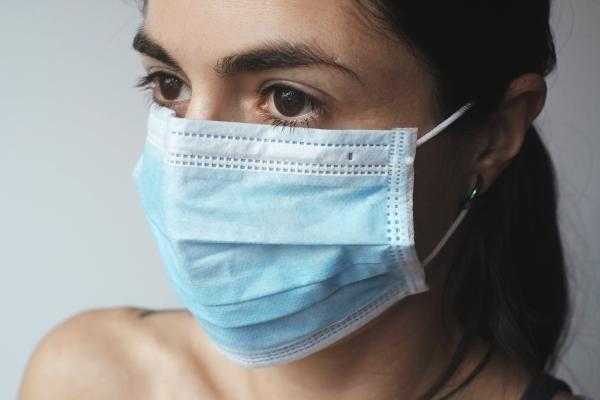The introduction of COVID vaccines created a conundrum for public health officials: the clinical trials showed that the shots effectively prevented severe illness and death, but there initially weren't enough doses to go around, and it was unclear if immunization sufficiently reduced transmission of SARS-COV-2. The only reasonable response at the time, according to federal officials, was to vaccinate the most vulnerable populations and maintain masking and social distancing guidelines.
Now that vaccine distribution is in full swing, some experts are criticizing the CDC for maintaining only slightly less restrictive guidelines for fully immunized individuals, because it signals to everyone else that the shots aren't very effective and could thus undermine further vaccine uptake. This is especially troubling when we consider that the lingering unvaccinated population likely includes a lot of people who aren't sold on getting immunized yet.
CNN captured the crux of the issue last week:
The CDC issued new guidance [April 27], saying fully vaccinated people can unmask at small outdoor gatherings or when dining outside with friends from multiple households -- activities the CDC said require unvaccinated people to still wear a mask.
But some experts said the new guidance is too cautious and doesn't offer a strong enough incentive for Americans who still are on the fence about getting a shot or who may have already been unmasking in those settings. "It doesn't go far enough," Dr. Jonathan Reiner, professor of medicine and surgery at George Washington University, told CNN on Tuesday night. "What it doesn't really underscore for Americans is what the CDC knows, which is that these vaccines induce immunity."
Based on the available data, Reiner has a solid case that the CDC is probably being too cautious in its efforts to stem to new infections.
COVID vaccines are very effective
COVID cases in the US are dropping. As of May 2, they were down 22,000 per day from three weeks ago, and "daily Covid-19 cases and deaths are now about one-fifth of what they were during their winter peaks," CNN reported on May 4. This is excellent news and almost certainly due to our relatively widespread vaccine coverage so far. More than 40 percent of the country has received at least one dose of an approved shot, and a little over 30 percent is fully vaccinated. [1]
These numbers seem to fit well with the studies from late 2020 and earlier this year showing that the Pfizer-BioNTech, Moderna and J&J vaccines not only drastically cut morbidity and mortality but blunt transmission as well. This makes sense because the shots work by reducing an individual's viral load (the amount of virus they carry), which means each vaccinated person is far less likely to infect somebody else.
A March 29 CDC study of nearly 4,000 frontline medical personnel similarly found that two doses of either mRNA-based shot (Pfizer-BioNTech or Moderna) were 90 percent effective against SARS-CoV-2, “regardless of symptom status.” A single dose of either shot was 80 percent effective. The authors outlined the significance of this result as it relates to viral transmission:
Reducing the risk for transmissible infection, which can occur among persons with asymptomatic infection or among persons several days before symptoms onset (6), is especially important among health care personnel, first responders, and other essential and frontline workers given their potential to transmit the virus through frequent close contact with patients and the public.
Rounding out our review of the research, Public Health England released a study of 57,000 vaccinated people in late April showing that
those who do become infected 3 weeks after receiving one dose of the Pfizer-BioNTech or AstraZeneca vaccine were between 38% and 49% less likely to pass the virus on to their household contacts than those who were unvaccinated.
Moreover, it's possible the study underestimated the transmission reduction from the vaccines because the immunized person's contacts may have been infected by someone else.
Confused messaging undermines confidence in vaccines
Despite this mounting evidence that the approved shots greatly reduce the risk of transmission, the CDC maintains that “We are still learning how well vaccines prevent you from spreading the virus that causes COVID-19 to others, even if you do not have symptoms.” Like so much information circulating online these days, this is technically true but unhelpful. The pandemic is just over a year old; “we are still learning” about every aspect of SARS-COV-2, and we will be for years to come.
But the CDC wants it both ways. The agency emphasizes the safety and efficacy of the shots and urges you to get them to "protect people around you," then tries to deny people the incentives that would encourage additional vaccine uptake. It's another example of the confused messaging that has undermined public trust in the scientific establishment over the last year. Vaccine expert Dr. Ben Locwin laid bare the obvious flaw in this reasoning in an email. We'll give him the last word:
Keeping unnecessary mask and distance restrictions - on the immunized - is the exact WRONG messaging, and erodes the public national vaccine campaign. It's pandering, and it's scientific nonsense. After being fully immunized, it's as safe for those people as it's ever going to get.
[1] CDC: “For the purposes of this guidance, people are considered fully vaccinated for COVID-19 ≥2 weeks after they have received the second dose in a 2-dose series (Pfizer-BioNTech or Moderna), or ≥2 weeks after they have received a single-dose vaccine (Johnson and Johnson (J&J)/Janssen).”




